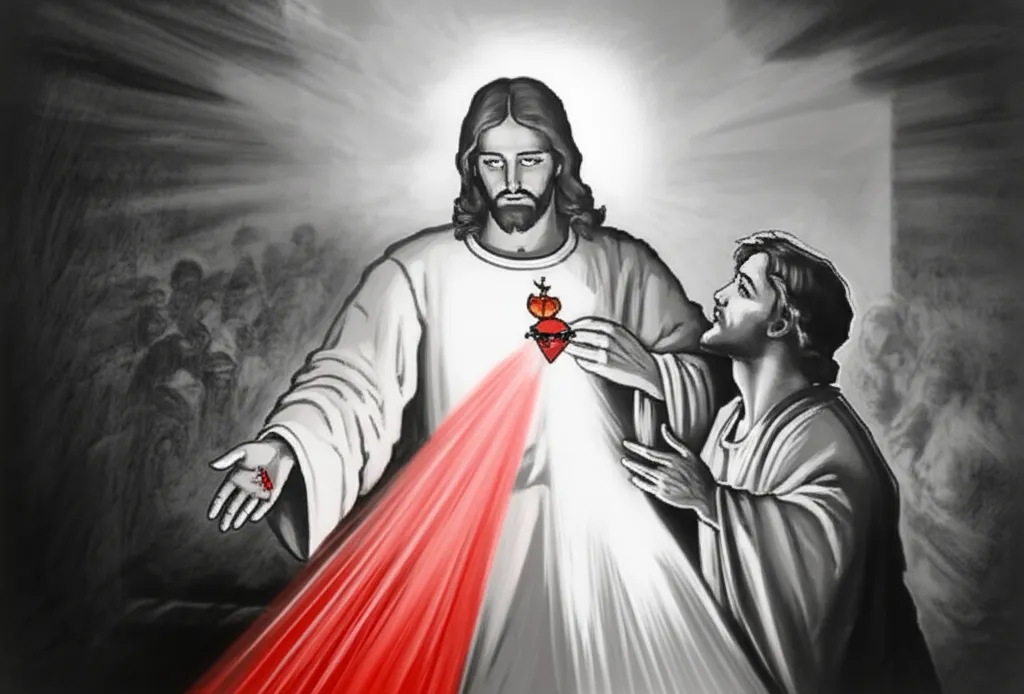As we gather this Second Sunday of Easter, also celebrated as Divine Mercy Sunday, we find ourselves reflecting on the transformative power of faith, doubt, and the boundless mercy offered to us through Christ's resurrection. The readings today invite us to consider the nature of belief, the importance of community, and the tangible presence of the risen Lord in our lives.
The Power of Community and Witness
The first reading from the Acts of the Apostles (Acts 5:12-16) paints a vivid picture of the early Christian community. United in faith, they performed "many signs and wonders," drawing people to them and offering healing to the sick and afflicted. This passage highlights the importance of communal life in fostering faith and extending Christ's healing ministry. It reminds us that our actions, when rooted in genuine love and compassion, can be powerful witnesses to the Gospel.
We see here a reflection of the early Church's commitment to social justice, a principle that calls us to actively engage in the well-being of others, especially those marginalized and suffering. Just as the apostles ministered to the physical and spiritual needs of the people, we too are called to be instruments of healing and hope in a world marked by division and despair.
Encountering the Risen Lord
The reading from Revelation (Revelation 1:9-11a, 12-13, 17-19) offers a glimpse into John's mystical encounter with the resurrected Christ. This passage is rich in symbolism, depicting Christ as the Alpha and Omega, the beginning and the end, the one who holds the keys to death and the netherworld. John's vision reminds us that Christ's victory over death is not merely a historical event but a present reality that transforms our understanding of life and eternity.
The imagery of Christ standing among the lampstands evokes a sense of divine presence illuminating the world. It suggests that Christ is not distant or detached from our struggles but actively present, guiding and sustaining us through the darkness. This mystical encounter invites us to seek a deeper, more personal relationship with Christ, one that transcends the limitations of our physical senses.
From Doubt to Faith: The Story of Thomas
The Gospel reading from John (John 20:19-31) centers on the story of Thomas, the apostle who doubted the resurrection until he personally encountered the risen Lord. Thomas's doubt is often seen as a weakness, but it can also be viewed as a testament to his honesty and his desire for tangible proof. Jesus's response to Thomas is not one of condemnation but of understanding and invitation: "Put your finger here and see my hands, and bring your hand and put it into my side, and do not be unbelieving, but believe" (John 20:27).
This encounter speaks to the human need for evidence and the challenges of faith in a world that often demands empirical proof. However, Jesus's subsequent statement, "Blessed are those who have not seen and have believed" (John 20:29), points to a higher form of faith, one that transcends the need for physical evidence and embraces the mystery of God's love.
Thomas's journey from doubt to faith mirrors the spiritual journey of many believers. We may struggle with questions, uncertainties, and moments of doubt, but it is through these struggles that our faith can deepen and mature. The story of Thomas reminds us that it is okay to question, to seek answers, and to wrestle with our beliefs. God meets us where we are, offering grace and understanding along the way.
Divine Mercy and Forgiveness
Divine Mercy Sunday, established by Saint John Paul II, emphasizes the boundless mercy of God, particularly as revealed through the Passion, Death, and Resurrection of Jesus Christ. This day invites us to reflect on the depth of God's love for humanity and to seek forgiveness for our sins. It also calls us to extend that same mercy and compassion to others, recognizing that we are all in need of God's grace.
The Gospel reading reinforces this theme of mercy through Jesus's words to the disciples: "Whose sins you forgive are forgiven them, and whose sins you retain are retained" (John 20:23). This passage highlights the power of forgiveness and the importance of reconciliation in our relationships with God and with one another. It reminds us that we are all called to be instruments of God's mercy, offering forgiveness and compassion to those who have wronged us.
Living Out Our Faith
As we reflect on these readings, let us consider how we can live out our faith with greater sincerity and conviction. Let us strive to be communities of healing and hope, extending compassion to those in need. Let us embrace the mystery of faith, even when doubts arise, trusting in the boundless love and mercy of God. And let us be instruments of forgiveness, offering grace and reconciliation to those who have wronged us. May we, like Thomas, come to a deeper understanding of who Christ is, and proclaim with unwavering faith, "My Lord and my God!" (John 20:28).
